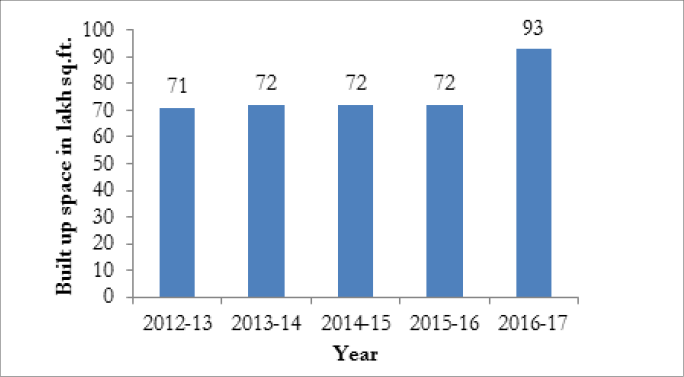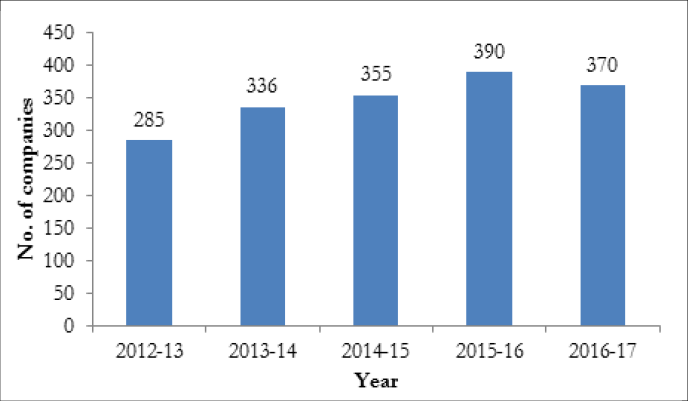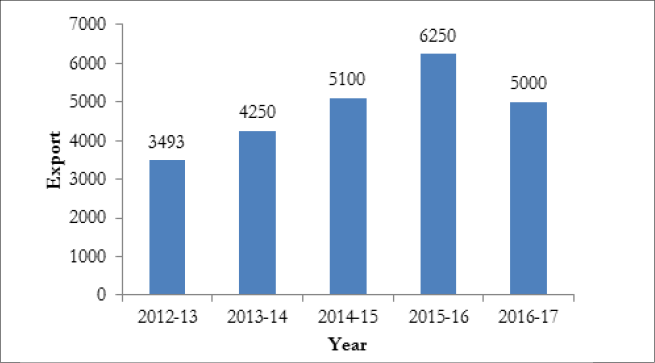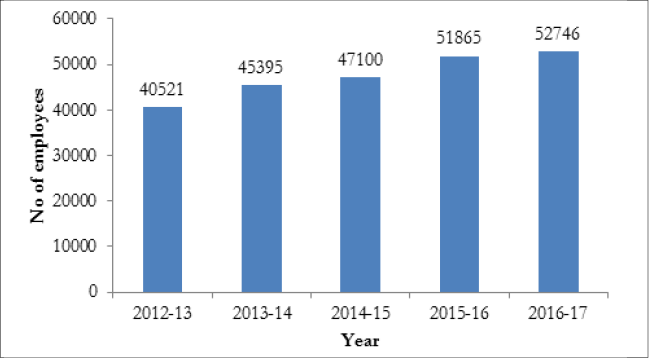Information technology is imperative not only for the development of modern industries but for the general well being of the State. Information and Communication Technology sector has been playing an important role in the development of the State, since the 9th Five-Year Plan. Realising its potential and critical importance, the State Government have made earnest efforts to create a sound and world class infrastructure for the sector and to develop the State's digital technology capacities and resources. This has enabled the State to be at the forefront in implementing information and communication technology projects, e-governance initiatives, e-literacy programmes and in the creation of basic IT infrastructure facilities. Currently the State has the highest mobile penetration in the country with about 32 million connections, the highest Internet penetration, covering about 20 per cent of households through broadband and another 15 per cent through mobile, and is making significant strides in transforming the State into a knowledge powered economy. Kerala is one of the significant IT destinations in India and ranks 8th in the export by Software Technology Parks of India (STPI) registered IT and ITeS (Information Technology enabled Services) units. Moreover, Kerala is fast emerging as a major player in the digital economy in India.
The information technology sector has recorded a steady growth over the last decade and various frontiers have been opening up in relation to the application of information technology in day to day life. From the emergence of artificial intelligence to self-driving vehicles and the extensive disruption brought about by the internet based business models, IT sector has been revolutionising every sector in the economy. To stay competitive as an IT destination, the IT sector in Kerala must significantly enhance the value addition it brings to the State economy. It must attract investment in emerging areas in the IT sector and not rely solely on established IT/ITES activities. As the Indian IT sector as a whole grapples with issues of the changing focus and emerging issues within the global IT sector, Kerala must also keep pace with these changes. At the same time, the considerable advancements that have been made in the digital empowerment of the population and the spread of IT awareness and use must continue to be built upon and developed with further investment in appropriate infrastructure that will continue to serve the State's needs over a period of time and not risk early obsolescence.
Government of Kerala recognises the critical importance of ICT as the key vehicle for the State's overall equitable development, reiterating its commitment to the sector, the Government revised the Information Technology Policy for the State in 2017. The vision of the State's policy is to establish Kerala as a knowledge powered digital society by 2020 through the application of digital technologies in the areas of digital citizenship, digital lifestyle and digital commerce; within the governing principles of freedom, ubiquity, inclusion, transparency, safety and security for all; aligned to technology trends, citizen and industry needs, to provide overall social and economic empowerment of citizens.
Kerala has a strong infrastructure and human resource strength to adopt digital facilities. We need to leap forward attracting substantial investment in IT sector and identify and promote young entrepreneurs through start ups.
Kerala State Information Technology Mission (KSITM), Indian Institute for Information Technology and Management – Kerala (IIITM-K), Technopark, Infopark, Cyberpark, Kerala State Information Technology Infrastructure Ltd. (KSITIL),International Centre for Free and Open Source Software (ICFOSS), Kerala Start-up Mission (KSUM) and Centre for Development of Imaging Technology (C-DIT) are the major agencies involved in the implementation and promotion of Information Technology related activities in the State.
The State Government envisages expansion of IT industry in the State in a manner that benefits all the districts in the State. A hub and spoke model has been planned. Thiruvananthapuram (Technopark), Kochi (Infopark) and Kozhikode(Cyber Park) will act as hubs and the remaining districts will be the spokes.
Government of Kerala provided an amount of 1,623.12 crore during Twelfth Five-Year Plan for the development of core IT infrastructure, ITeS and e-governance activities. The expenditure incurred was 1,159.74 crore (71.5 per cent). In the Annual Plan 2017-18, the outlay earmarked for the sector was 5,49.31 crore, which is 13.76 per cent higher than the previous year. The details of Plan outlay and expenditure are given in Table 3.1.17.
| Sl. No. | Agency | 12th Five-Year Plan (2012-17) |
Annual Plan 2016-17 |
Annual Plan 2017-18 |
||
| Outlay | ||||||
| Outlay | Expenditure | Outlay | Expenditure | |||
| 1 | Kerala State Information Technology Mission (KSITM) | 46465 | 22143.24 | 13058 | 6235.04 | 14748.00 |
| 2 | Indian Institute of Information Technology and Management – Kerala (IIITM – K) | 7990 | 6454.12 | 2050 | 2050 | 5200.00 |
| 3 | International Centre for Free and Open Source Software (ICFOSS) | 830 | 220 | 220 | 500.00 | |
| 4 | Technopark | 32146 | 64188.04 | 7600 | 9552.28 | 8400.00 |
| 5 | Infopark | 26461 | 6161 | 8689.43 | 6705.00 | |
| 6 | Cyber park | 9037 | 2568 | 2510.57 | 2569.00 | |
| 7 | Kerala State Information Technology Infrastructure Ltd. (KSITIL) | 16485 | 6575.66 | 5780 | 1075.66 | 5560.00 |
| 8 | Indian Institute of Information Technology-Pala (IIITK Pala) | 500 | 5925.00 | 500 | 500 | 2250.00 |
| 9 | Startup Mission | 22295 | 9320.90 | 10000 | 1977.71 | 7999.00 |
| 10 | C-DIT | 1000.00 | ||||
| Others | 103 | 1367.50 | 1 | |||
| Total | 162312 | 115974.46 | 47938 | 32810.68 | 54931.00 | |
| Source: Budget Estimate | ||||||
Kerala State Information Technology Mission (KSITM)
Kerala State IT Mission is a society registered under the Travancore Cochin Literary Scientific and Charitable Societies Registration Act, 1955. It is an autonomous nodal IT implementation agency of the Department of Information Technology, Government of Kerala, which provides managerial and technical support to various initiatives of the Department.
The major objectives of KSITM are interface between the Government and the industry, interaction with potential investors, strengthening the IT/ITeS industry base, holding promotional campaigns in the State, ICT dissemination to bridge the digital divide, e-governance, developing human resources for IT and ITeS and advising the Government on policy matters. As a result of these proactive policies and projects, Kerala achieved major progress in the transformational journey towards “Digital State”.
Some of the major achievements are shown below.
E-governance Programmes of KSITM
In the present world, e-governance is an important tool for good governance by achieving transparency, reliability, and accountability in rendering services. Kerala has been a forerunner in e-governance and mobile governance by promoting and developing core infrastructure and e-literacy programmes.
E-office aims to conduct office procedures electronically thereby transforming government offices to paperless offices and bringing out the benefits of digital communication that ultimately leads to faster decision making. So far it has been implemented in 39 out of 42 departments in Secretariat and 22 departments outside Secretariat. The Government has decided to roll out e-office sto Districts, Directorates and Taluk level.
Service Plus is a software designed and developed by NIC, under Ministry of IT. It configures and launches e-services quickly using its flexible workflow and has provision for dynamic design of application forms.
Core infrastructure for e-governance in the State consists of Kerala State Wide Area Network (KSWAN), Secretariat Wide Area Network (SECWAN), State Data Centre and State Service Delivery Gateway (SSDG). KSWAN is the backbone of the State Information Infrastructure (SII), connecting Thiruvananthapuram, Kochi and Kozhikode extending to 14 districts and 152 Blocks Panchayats of the State. The network will also connect 3500 offices of Government Departments through wireless and a larger number through leased lines and LAN.
M-Keralam, the unified mobile application which will bring together all the services rendered by different Government departments under one umbrella is getting ready for launch with nearly 100 services.
E-government procurement (e-GP) is being implemented in the State, 53 government departments and 220 PSUs/autonomous bodies/government agencies are utilising the common e-Procurement system. 1,764 offices (under various government departments and government bodies) have been mapped into the e-Procurement system.
Friends Janaseva Kendras have been established in all the 14 district headquarters. In 2016-17, 16.31 lakh transactions were made and 183.48 crore revenue for the government was collected.
Akshaya is an innovative project launched on 18th November 2002 to bridge the digital divide. It works on public private participation mode. In the initial stages the objective of the project was to make at least one person in a family e-literate. Gradually focus of Akshaya shifted to citizen service centric mode. At present, 2,679 Akshaya Centres are functioning across the State giving employment to 7,774 persons. More than 700 Aadhaar enrolment centres are working successfully State-wide. More than 1,700 Akshaya Centre act as Banking Kiosks for different banks.5.5 million citizens got enrolled under UID through Akshaya Centers. Enrolment under UID through Akshaya is 92.7 per cent against the national average of 62 per cent. Akshaya is also a premier agency in UID enrolment having generated 75 per cent of total UIDs in Kerala.
The details of Akshaya centres in Kerala are furnished in Appendix 3.1.52.
Awards and Accolades
Indian Institute of Information Technology and Management – Kerala (IIITM-K)
The Indian Institute of Information Technology and Management – Kerala was set up in the year 2000 as a premier institution of excellence in Science, Technology and Management. It emphasises quality education to students and develops professionals and leaders of high calibre imbued with values of entrepreneurship, ethics and social responsibility. The institute focuses on education, research, development and training in applied information technology and management.
The M Phil and MSc degree are awarded by Cochin University of Science and Technology (CUSAT) and post graduate diploma by Directorate of Technical Education, GOK. The major projects completed are Biometric Embedded System Security and Internet of Embedded Things, Software Engineering and Software Project Management Unit and Library and Information Service. Construction of a full-fledged residential academic campus for IIITM-K as per UGC/AICTE norms is in progress.
Technopark
Electronics Technology Parks – Kerala, popularly known as Technopark was setup under the auspicious of Government of Kerala as an autonomous body to create global standard infrastructure and to provide total support required for development of high technology industries. It was formally dedicated to the nation on November 18, 1995. Since then Technopark has been growing steadily both in size and employees strength. With the commissioning of Phase III, Technopark will become the largest IT Park in India with 330 acres of land, 9.3 million sq. ft built up area. Technopark through its companies, currently provides direct employment to 53,000 IT employees and offers an indirect employment for another 1,50,000 persons. With the launch of Technocity project in Kazhakuttam, the largest integrated IT Township in 424 acres of land has became the first IT Corridor in Kerala. Technopark has charted out an ambitious target of creating 56000 new jobs by 2020. Technopark has 5 campuses which is spread over 760 acres under various phases of development. Details of physical achievements and growth of Technopark are given in Appendices 3.1.53 and 3.1.54.
Land available with Technopark
Total land available with Technopark is 760 acres. The details of extent of land in its 5 campuses are shown below:-
Growth of Built up Space in Technopark
The built up space in the Technopark has increased from 72 lakh sq feet in 2015-16 to 93 lakh sq feet in 2016-17. The growth of built up space in the Technopark is shown in Figure 3.1.15.
 Source: Technopark
Source: Technopark
Companies in Technopark
There has been an increase in the number of the companies working in Technopark during the first 4 years of 12th Five-Year Plan. In 2012-13, there were 285 companies in Technopark. It increased to 390 in 2015-16 and decreased to 370 in 2016-17 and remains the same as on 31/08/2017. The number of companies in Technopark from
2012-13 to 2016-17 is exhibited in Figure 3.1.16.
 Source: Technopark
Source: Technopark
Growth of Export from Technopark
The exports from Technopark increased from 3,493 crore in 2012-13 to 6,250 crore in
2015-16. But in 2016-17, it declined to 5,000 crore. The elections and subsequent shift in policy in US affected India's software exports to the country to a big extent.The trend in export from Technopark during the last five years is depicted in Figure 3.1.17.
 Source: Technopark
Source: Technopark
Growth of Employment in Technopark
The growth of Technopark can also be analysed in terms of employment generated during the last five years. The employment generated increased from 40,521 in 2012-13 to 52,746 in 2016-17(up to August 31, 2017). The growth of employment generation for the last five years is shown in Figure 3.1.18.
 Source: Technopark
Source: Technopark
Technocity
Technopark has acquired 424 acres of land at Pallipuram for its Technocity project. Work on basic infrastructure has commenced and land has been allotted to TCS, Infosys, Suntec, KASE and IIITM-K.
Infopark
Infopark, Kochi is the second largest IT hub in Kerala with spokes at Cherthala and Thrissur. The objective of Infopark is creation of state- of-art infrastructure facilities such as space for IT/ITeS companies, supply of power, water and connectivity etc.
At present Infopark has the following IT Parks at Kochi- Phase I spread over in 102.82 acres, Phase II in 160 acres, Infopark, Thrissur located at Koraty in 30 acres and Infopark, Cherthala in 66 acres of land.
Since its inception in 2004, Infopark and its co-developers created over 66 lakh sq. ft built up space and have provided employment to over 33,116 IT Professionals through 298 IT companies who have taken space in its Parks. In case of Infopark TBC, a built up partly fitted space of 25,845 sqft at Kaloor international stadium was taken over from KSITM in the year 2013. Infopark undertook necessary balance fit outs, modifications/rectifications in the fitted out space and now the facility is mainly used for providing office space for startup companies. Around 400 IT employees are working in Infopark TBC. The physical achievements of Infopark are furnished in Appendix 3.1.55.
Cyberpark
Cyberpark was established in the lines of Technopark in Trivandrum and Infopark in Kochi based on a hub and spoke model. It was set up to bridge the IT infrastructure gap along the west coast starting from Kochi to Kasargod. The Cyber Park, Kozhikode acts as the hub and the parks in Kannur and Kasaragod are the spokes for the IT and infrastructure development of the northern region in the State. The objective of Cyberpark is to provide a friendly, cost effective and top of the line infrastructure to the IT/ITeS investors and thereby encouraging, promoting and boosting the export of software/software services and creating employment opportunities in Malabar region.
The major achievements during the last five years is shown below.
The achievements of Cyberpark are given in Appendix 3.1.56.
Kerala State Information Technology Infrastructure Ltd (KSITIL)
Kerala State Information Technology Infrastructure Limited (KSITIL) is a public limited company formed under the Companies Act 1956. The company leverages the valuable land assets owned by the Government and through viable financial models, generates funds for building the IT Infrastructure in the State in a Private Public Participation model. The business model of the company is to acquire land and develop basic infrastructure facilities like electricity, water, road and compound wall in the area, obtain SEZ status and other such Government approvals that may be required and then allot land to private developers for development of either IT SEZ or IT parks.
Major ongoing projects of KSITIL are Kozhikode IT Park, Kannur IT Park, Kasaragod IT Park, Kollam IT Park, Koratty IT Park, Cherthala IT Park, Ambalapuzha IT Park, Infocity Pala, IIIT-Kerala andTechnolodges.
International Centre for Free and Open Source Software (ICFOSS)
Govt. of Kerala established International Centre for Free and Open Source Software (ICFOSS) as an international centre in collaboration with Free Software Organisations in India and abroad to promote development and application of free software and free knowledge. It is a nodal agency in all matters relating to free and open source software including consultancy, research and development, academics, studies and service, training, publishing, certification, international co-operation and collaboration. The major programmes of ICFOSS are shown in Box 3.1.15.
Start-up acceleration for FOSS enterprises.
E-Governance and other FOSS studies.
Localisation of accounting and other utility software.
ICT support to Micro, Small and Medium Enterprises
Technical workshops and training programmes
FOSS certification
Capacity building and skill up gradation for engineering/technology students.
Malayalam computing.
Research programme
Source: ICFOSSKerala Startup Mission (KSUM)
Kerala Start up Mission (KSUM) is the nodal agency of Govt. of Kerala for implementing the entrepreneurship development and incubation activities in the State. Kerala Start up Mission, formerly known as “Technopark Technology Business Incubator” is India's first successful non academic business incubator. It started operations in 2007.
The objective of the Mission is to identify and develop entrepreneurial talents among youth and students in Kerala, address the technology based entrepreneurship development requirements in the traditional sectors of Kerala, build appropriate training programmes suitable for Kerala's socio-economic culture, identify market niche for technology products and services, interfacing and networking among academic, R&D institutions, industries and financial institutions, establishing a platform for speedy commercialization of the technologies developed in the institutes to reach the end-users.
Government of Kerala has introduced Youth Entrepreneurship Development Programme targeted to foster entrepreneurship skills among the youth in Kerala which includes key initiatives like Raspberry Pi Programme, Startup Box Campaign, Startup Boot camp, Start up Leadership Academy and Training programme, International Entrepreneurial Exchange Programme, FABLAB Programme, Entrepreneurship Driving Programme, Performance Linked Scheme and Patent Support Scheme. In addition to the above, Govt. is creating a Technology Innovation Zone at KINFRA Hi Tech Park, Kalamassery with multiple sectors of incubators under a single umbrella.
The major achievements during the last 5 year period are as follows:
Centre for Development of Imaging Technology (C-DIT)
Centre for Development of Imaging Technology (C-DIT) is an autonomous research and training institute under Government of Kerala. Apart from its initial role as an R and D organization in imaging technology and development of communication, C-DIT has done pioneering work in the State in integrating IT with governance, including the formation of Information Kerala Mission for computerization in all LSGIs, implementation of the flagship programme of FRIENDS citizen service centres and as a total solutions provider for providing services related to computerization in Government department and agencies.
IT Policy 2017
The new IT policy announced by the government in 2017 aims to generate projects which will mould Kerala into knowledge based society. The main objective of the policy is to establish Kerala as a leading IT destination and generate direct and indirect employment opportunities in the sector, build necessary technological infrastructure for creation of an environment favourable to ICT development, enhance the necessary human capital required to both produce and use innovative technologies through education and skill building and establish Kerala as an IT industry destination by attracting investments from within and outside Kerala. The policy aims to:
Creation of more employment opportunities through the generating of one lakh jobs during XIII Plan.
Making available trained human resources through ensuring skill development activities in all educational institutions.
Development of an eco-system for start ups through the promotion of constant innovation through new startups and thereby developing new products and services.
Enabling IT for the management and monitoring of the activities of the 4 Mission of the Government.
Public access to high speed digital services by providing Wi-Fi hotspots.
Integration of wide variety of data of Government departments, agencies and institutions on a single platform.
Conclusion
Even though, Kerala has achieved remarkable progress in creating infrastructure for IT sector and generated employment opportunities during the last five year plans; the State lags behind in creating research and development infrastructure for establishing a knowledge economy. In the coming years, the State shall focus on developing competitive advantages in new avenues of IT. ICT enabled education, research and development and innovations in the sector needs to be identified and promoted to strengthen the State economy. Moreover, the thrust of government in infrastructure development, human resource development and overall economic development will open up large opportunities for the meaningful use of Information Technology.